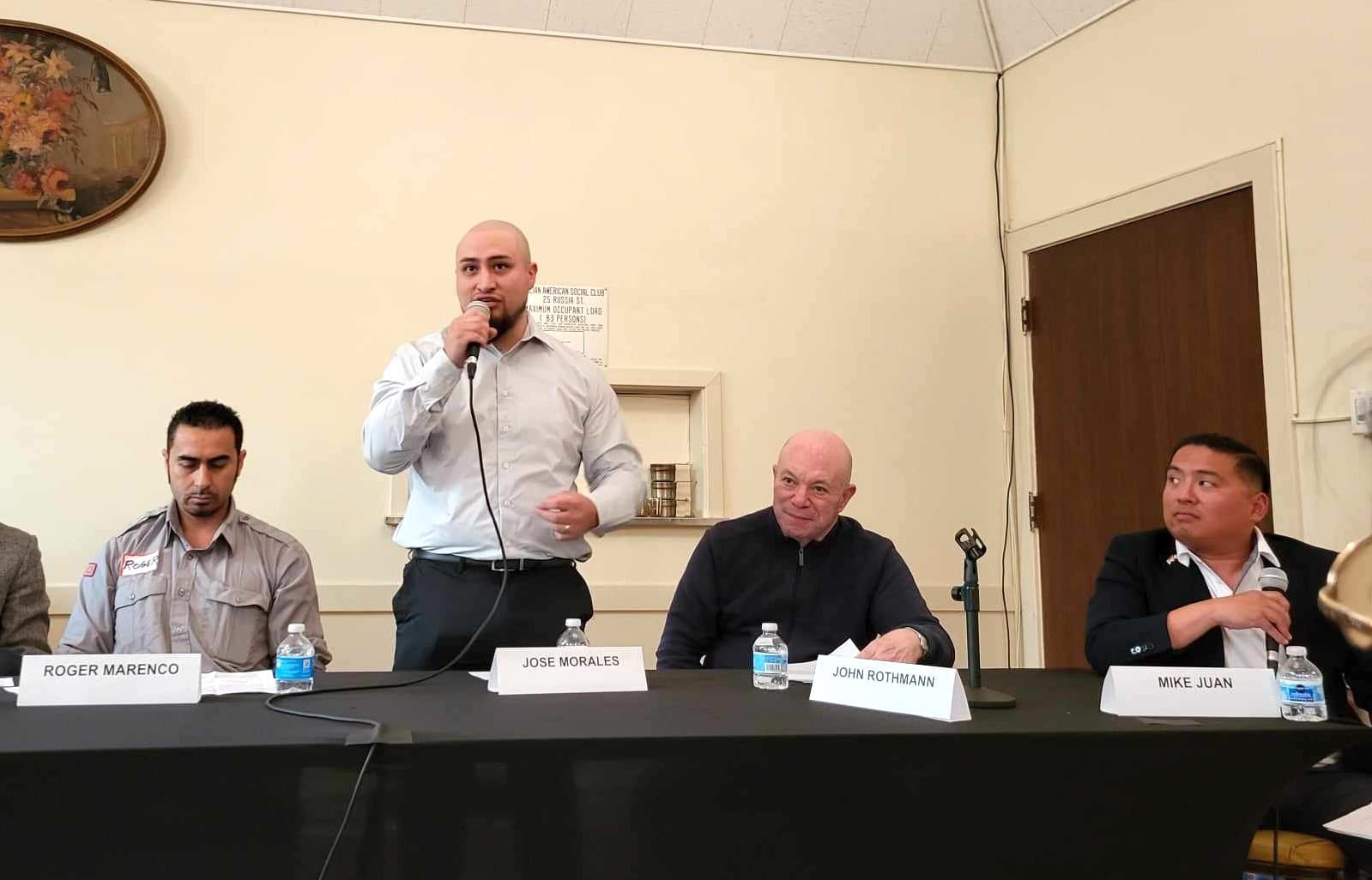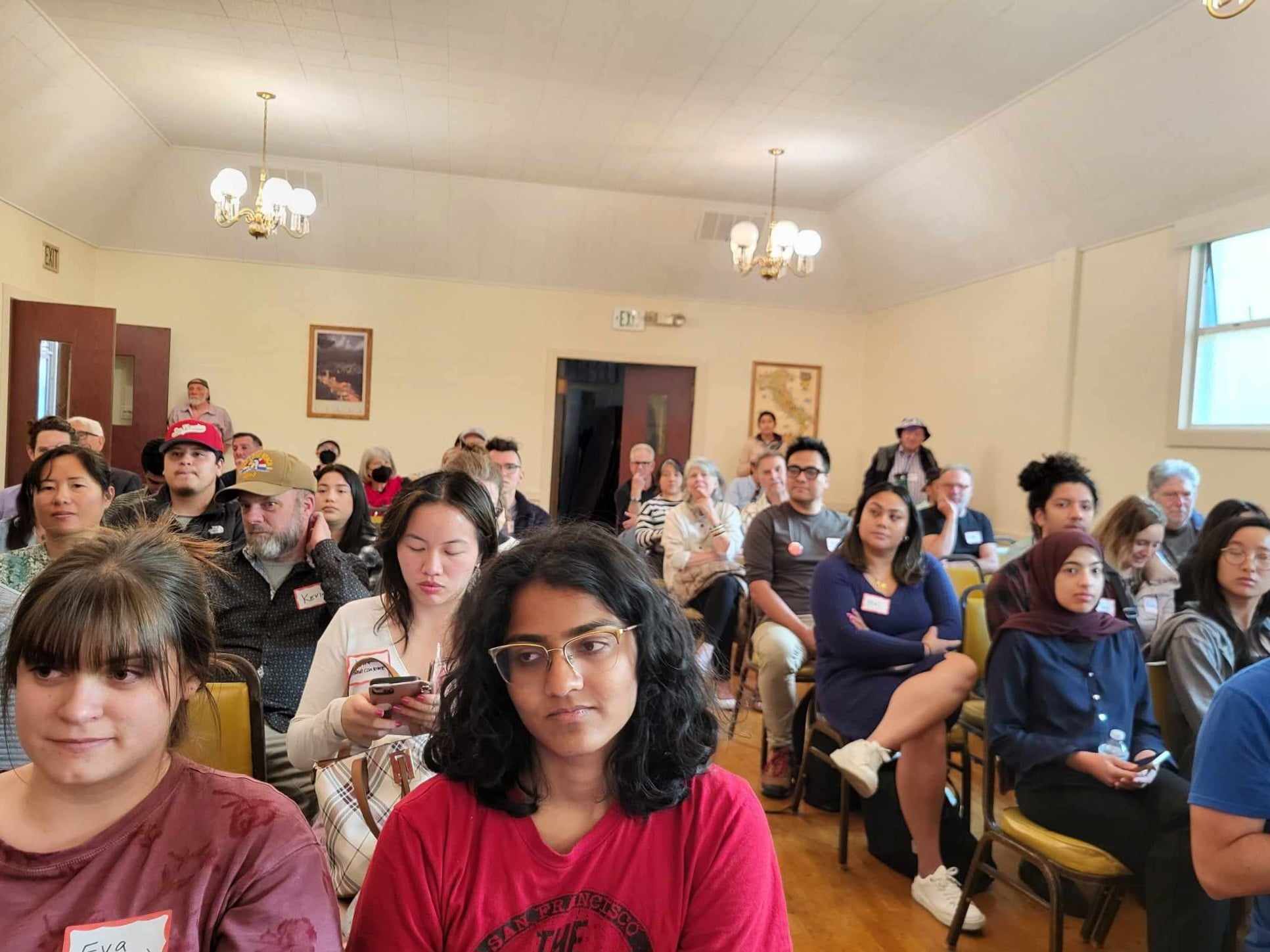The race for District 11’s next supervisor is heating up as six of the seven registered candidates took center stage in the American room at the Italian Social Club on Wednesday night for a forum.
EJ Jones, Roger Marenco, Adlah Chisti, Chyanne Chen, Michael Lai and Jose Morales spoke in the November 2024 race’s first forum, which was put on by community safety and activist group Advocates 11 and ConnectedSF, which Mission Local described as a political pressure group funded with over $500,000 from the billionaire-backed but embattled Neighbors for a Better San Francisco.
“Our goal here is to educate and inform voters and advocate for sensible solutions to issues in our district and our city,” said Mike Juan, co-moderator and president of Advocates 11.
Juan and John Rothman, the other moderator and podcaster for the new nonprofit news outlet the Voice of San Francisco, asked each candidate 13 questions that they got to review in advance and were sourced from the public. The questions focused on managing city funds and departments in light of recent scandals, the ongoing drug, homelessness, mental health care, transportation and recent upzoning initiatives.
During the first round candidates were given one minute to answer each question and alternated who spoke first after each question.
The first question centered on the city’s projected $800 million budget shortfall over the next two years. Candidates were asked which three departments they would cut and which three they would save.
Though answers differed, there was a consensus on reevaluating the way the Department of Homelessness and Supportive Housing and the Municipal Transportation Agency are funded. They also agreed budgets should be preserved for first responders, health care, children's services and education, libraries and the Recreation and Parks Department.
“On the revenue side, our tax code is very complex and structured in a way where it's driving out downtown businesses and so we need to reform the tax code such that it's more resilient, it's based on sales rather than payroll, while not pushing out retailers,” Lai said. “On the cost side, I'll tell you what I won't cut. I'm not going to cut essential services and public safety so police, deputy sheriffs, fire, nursing, as well as children.”
Another question asked if SFMTA’s current operations were hurting or helping the city, namely its handling of Vision Zero, how it should be managed and reformed and the candidates' top three transportation priorities.

Most candidates agreed that SFMTA was too large and needed to be re-evaluated so one department wasn’t tackling every task like parking, ticketing, bus and train operations and other responsibilities. They also agreed that there needs to be more reliability in transit times and pedestrian safety like traffic calming measures.
“Vision Zero has zero vision,” said Marenco, who currently works as a streetcar operator. “SFMTA, with its Vision Zero plan, has accomplished the following: destroyed our streets, eliminated parking spaces, created unnecessary bike lanes, increased parking fees, angered residents and infuriated merchants. Now, have they been doing their job? Absolutely not.”
Morales, Chen, Chisti and Jones said there should be more community outreach from the transportation agency for traffic studies and bike lane implementations. Marenco, Lai and Morales also said the lack of parking in District 11 needed to be addressed.
The candidates were asked how they would clean up Mission Street and support small and minority-owned businesses and fill vacant storefronts.
The work of the Excelsior Action Group was criticized. Chisti, Jones and Lai defended the group’s work revitalizing the commercial corridor through community activations like block parties and spaghetti feeds.
The majority of candidates agreed that there was a need to identify vacant lots, cut red tape to help businesses grow and a need to restructure the current vacant storefront tax policy.
Chen, Morales, Chisti and Marenco said there should be greater funding and investments for owners of storefronts and empty lots such as financial assistance. They supported measures like downtown’s Vacant to Vibrant program and working with city departments to create easier access to resources like building business development hubs with access to merchant educational tools.
Marenco said he would apply harsher fines and fees against owners of vacant storefronts for “creating wasted space.”
Jones and Lai said they would boost foot traffic through improved safety and cleanliness improvements, marketing campaigns and having tenants that can be anchors in the community like Gentilly. Lai has also heard concerns on the rising of costs such as PG&E rates, which he hoped to work with his state-level connections to help lower.
“When I’m door knocking and talking to folks, everyone tells me they wish they had a restaurant, a business that they could bring people from the other side of town to in their own neighborhood and there’s no reason that we shouldn’t have that,” Jones said.
All candidates supported upzoning measures so long as there was careful consideration of affordable housing.
Chen, Lai, Marenco and Morales stated a need for parking considerations. Jones was not opposed to adding more parking but said that new housing without additional parking near public transit has been successful, citing Kapuso at the Upper Yard.
Chisti was in support of Mayor London Breed’s recent housing measures but said there was a need for public review for environmental justice and displacement studies.
“We should build a lot more housing that's affordable for everybody,” Morales said. “We should have businesses around those communities so people who live in those housing projects do not have to travel far to receive services.”
When the candidates were asked how they would address San Francisco’s ongoing illegal drug use and sales epidemic, all agreed on the need for stricter policies at local and state levels. Lai and Morales said there also needs to be a continued partnership between the offices of the District Attorney and the U.S. Attorney to keep drug distributors locked up.

Chen, Marenco, Jones and Lai added a need for proper and an increased number of treatment facilities for those suffering from addiction and resources for healthcare workers.
“We must be careful because we have federal involvement right now and we should not target community members who have not committed a crime,” Chisti said. “I think it's important to ensure fairness and it's important to avoid any discriminatory practices.”
When asked what is District 11’s top issue, the near-unanimous answer was public safety with an emphasis on investing in programs like community ambassadors, keeping fully staffed first responder departments, implementing cleanliness of streets, and tackling retail theft. Marenco said it was a crime with a need for stricter policies toward offenders.
“I think disinvestment in District 11 is a tough problem because we deserve safer and quality services in District 11,” Chen said.
The forum concluded with a brief lightning round before final thoughts from the moderators. Candidates were instructed to provide one-word answers and were asked if they supported the defunding of the San Francisco Police Department to which all responded no.
A recording of the forum will be available on The Voice of SF.
More candidates may enter the race. The deadline to file paperwork with the Department of Elections is in June.










